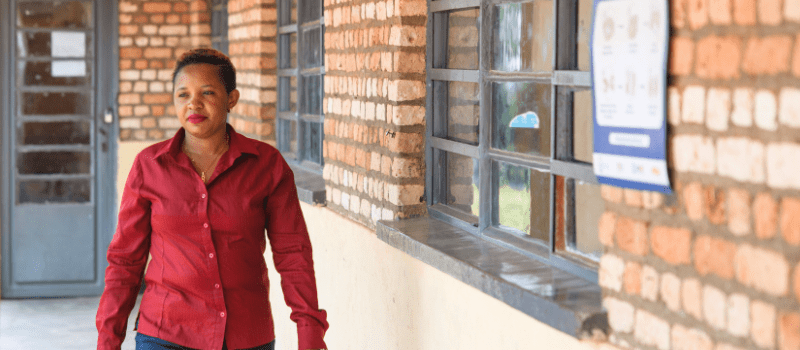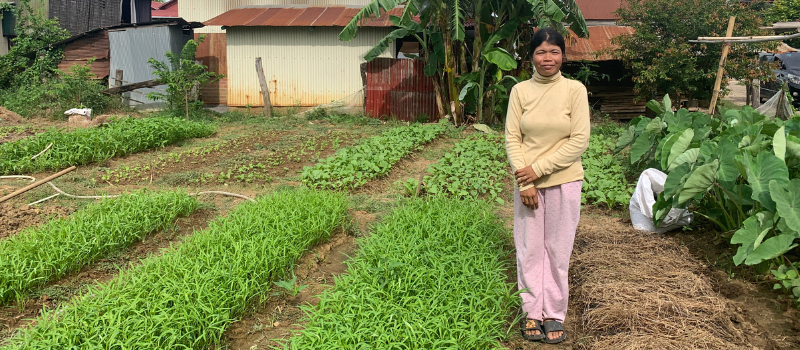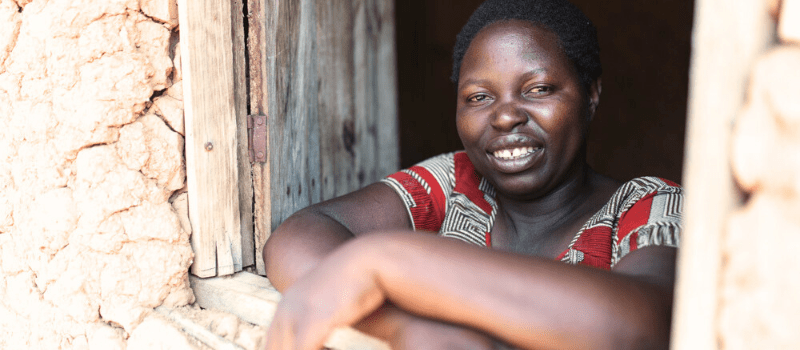This blog was written by Tanja Kisslinger, Director of Communications at VWB, in reflection of a trip to Rwanda in September 2025 to document our Community One Health Empowerment in Rwanda and Senegal (COHERS) program. Photos by Jess Holing for VWB.
A Woman Who Listens
At the sector office in Gasarenda Cell, the door never stays closed for long. Villagers come and go, carrying questions about school fees, land, livestock, and sometimes, sickness. Behind a simple wooden desk sits Donatha Anyinkamiye, Executive Secretary of Tare Sector—and one of the most respected leaders in Nyamagabe District.
“People come with every kind of issue,” she says with an easy smile. “Sometimes we go to them in the villages. The problems are different, but most are the same at their root—children with worms, families with stomach pains or diarrhea. And when you look closer, they are diseases that come from unclean conditions.”
Her calm assurance fills the room. Donatha’s work may sound administrative on paper—coordinating welfare, security, and development—but at its heart it’s about well-being. “Being a leader means being both a mother at home and a servant to the community,” she says. “Sometimes the children miss you, the husband misses you—but gradually, you find balance. You learn to care for both homes.”
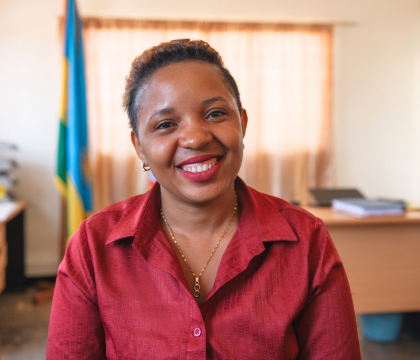 PHOTO:
PHOTO:
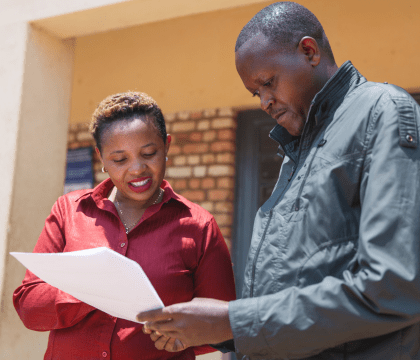 PHOTO:
PHOTO:
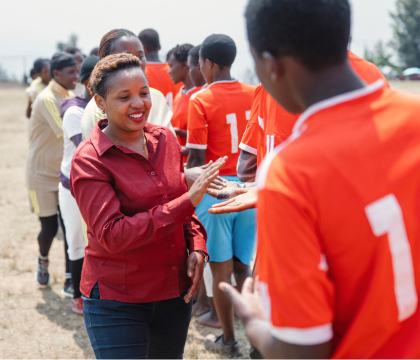 PHOTO:
PHOTO:
What People Bring
When residents arrive, the themes repeat: water, sanitation, animal management, and the illnesses that follow when any one of those breaks down. “When it comes to water,” she explains, “many residents still do not have access. At the district level we are close to 60%, so four in ten people still walk long distances to collect water—and often that water isn’t clean.”
Livestock is another concern. “People do not know how to raise animals with good housing and care,” she says. “You find pigs wandering into houses and to the neighbors. They don’t have enough knowledge to take care of them.”
Food safety is closely tied to this as well. “We have only one slaughterhouse in the sector, and it is for cows,” she notes. “For pigs, people slaughter at home, in the fields. It’s not good for cleanliness or for preventing disease, whether from dirt or from animals.”
Perhaps most telling is a gap in understanding. “People think they raise animals only to make money or to get manure,” she says. “They are not aware that livestock may also cause them disease.”
It’s a crisp description of why COHERS exists in the first place—because health is shared between people, animals, and the environment. And because breaking the Taenia solium (i.e., pork tapeworm) cycle requires each of those pieces to change together.
Turning Awareness into Action
To tackle these challenges, Donatha doesn’t wait for reports—she visits homes herself. “We go and see how families live,” she says. “Where they sleep, how they store food, how they use water. We don’t just tell them; we show them what can be improved.”
Every Tuesday morning, the entire sector joins what she calls “Hygiene Morning.” “For one hour, everyone cleans—homes, roadsides, markets,” she explains. “It’s not about rules. It’s about responsibility. It reminds us that health starts with our hands.”
Through her office, Donatha also helps ensure that schools, hygiene clubs, and community groups have the tools and support they need. “When children learn these habits early, they teach their parents,” she says. “That is how change grows.”
Her leadership mirrors the spirit of COHERS, which builds on local structures and trusted figures to make One Health real in daily life. In Tare Sector, that collaboration takes shape through Community Health Workers, Community Hygiene Clubs, and One Health Teams—all of whom Donatha supports and coordinates with.
“Each group has a role,” she says. “The One Health Teams teach about animals and disease prevention, the Community Hygiene Clubs teach about hygiene and handwashing, and the Community Health Workers visit homes to check on families. Together, they reach everyone. This coordination of awareness and action is what makes change last in Tare.”
Leading Through Partnership
In COHERS, collaboration isn’t just an approach—it’s the foundation. And Donatha’s leadership is a crucial part of that foundation. “When leaders understand and support programs like COHERS, it makes all the difference,” she says. “People trust us.”
That trust matters. In sectors like Tare, where Taenia solium transmission is fueled by poor sanitation, open defecation, and free-roaming pigs, programs like COHERS depend on local endorsement to succeed. By working hand in hand with district officials, sector secretaries, community committees, and trained health and sanitation experts, COHERS ensures that health interventions are not external projects but community priorities.
“In Tare, the COHERS program and representatives are helping us to see things differently,” Donatha explains. “Now, when we plan sector activities, we look at the whole picture: clean water, safe food, healthy animals, and women’s participation. It all fits together.”
Her leadership reinforces what the program aims to achieve—locally owned, gender-responsive, and sustainable systems that protect both people and animals.
Seeing Change in Motion
When asked what changes she’s seen since the program began, Donatha doesn’t hesitate. “People are more aware,” she says. “Before, they did not understand what hygiene really meant or why it mattered. Now, they remind each other.”
She explains, “If someone in the village doesn’t have a toilet, neighbors tell them to build one. If a child drinks unboiled water, the parent corrects them. Even with animals—it used to be normal for pigs and goats to walk everywhere. Now people build pens. They understand that healthy animals mean healthy families.”
These shifts may seem small, but for Donatha they represent deep change: the emergence of what she calls a “culture of care.”
“It’s not just about hygiene,” she explains. “It’s about community. People look out for each other now. They work together to help a widow build a toilet, or they collect money to fix a neighbor’s water source. That’s when you know the message has reached the heart.”
The Balance of Home and Leadership
Like many women leaders, Donatha has had to balance public service with family life. “As a woman, you have two homes to care for—your own and your community’s,” she says. “Sometimes my children or husband miss me. But my husband understands that leadership is shared. When I come home late, he helps the children with homework, he cooks. That is change too.”
Her story reflects a wider transformation that COHERS promotes: not only healthier systems, but more equitable ones. By bringing women into visible leadership roles—whether as One Health Team members, Community Hygiene Club participants, or sector executives—the program helps shift social norms and decision-making power.
“For a long time, women were told they could not lead,” she says. “Now they see that they can. When a woman leads, it gives others courage to try. That’s how communities change. Women—not just men—must feel capable of creating positive change and contributing. And men too must understand why this is essential.”
Leadership that Lasts
As part of her extensive duties as Executive Secretary, Donatha chairs Tare’s sector-level hygiene and health committee, which brings together representatives from schools, health centers, security agencies, and civil society. “We make sure everyone is involved—women, youth, people with disabilities,” she says. “Because hygiene is not one person’s job. It belongs to everyone.”
Through leaders like Donatha, COHERS has found a model for sustainability that reaches far beyond training sessions or project timelines. Her voice, like those of Louise Mukarugwiza (One Health Team member) and Josephine Mukagasana (Community Hygiene Club participant) carries the weight of local authority—and the trust of the people she serves.
“When people understand that their health, their animals, and their environment are connected, they don’t need to be told what to do,” she says. “They act because they see the benefit.”
That, she believes, is the ultimate goal. “Programs like COHERS don’t just bring support,” she adds. “They bring knowledge—and knowledge stays.”
A Future Rooted in Local Leadership
Across Nyamagabe, the results of this shared effort are visible and growing: cleaner compounds, penned livestock, covered food, and a renewed sense of cooperation. For Donatha, these are not statistics—they’re signs of resilience.
“What makes me proud,” she says, “is not just the toilets or the training. It’s the way people have changed their thinking. When health becomes part of our culture, that’s when the future is secure.”
As she returns to her work—reviewing reports, greeting visitors, answering questions from farmers and mothers alike—it’s clear that her leadership embodies what COHERS set out to achieve: empowered communities, sustained by knowledge, and strengthened by women who lead with care.
COHERS is a four-year initiative (2023–2027) that strengthens community health systems to prevent zoonotic diseases in Rwanda and Senegal by uniting human, animal, and environmental health. Funded by Global Affairs Canada and led by VWB, COHERS is delivered with local and international partners including the University of Global Health Equity, WaterAid Rwanda, the University of Guelph, the Institute of Health Economics, and Agronomes et Vétérinaires Sans Frontières. Learn more.

